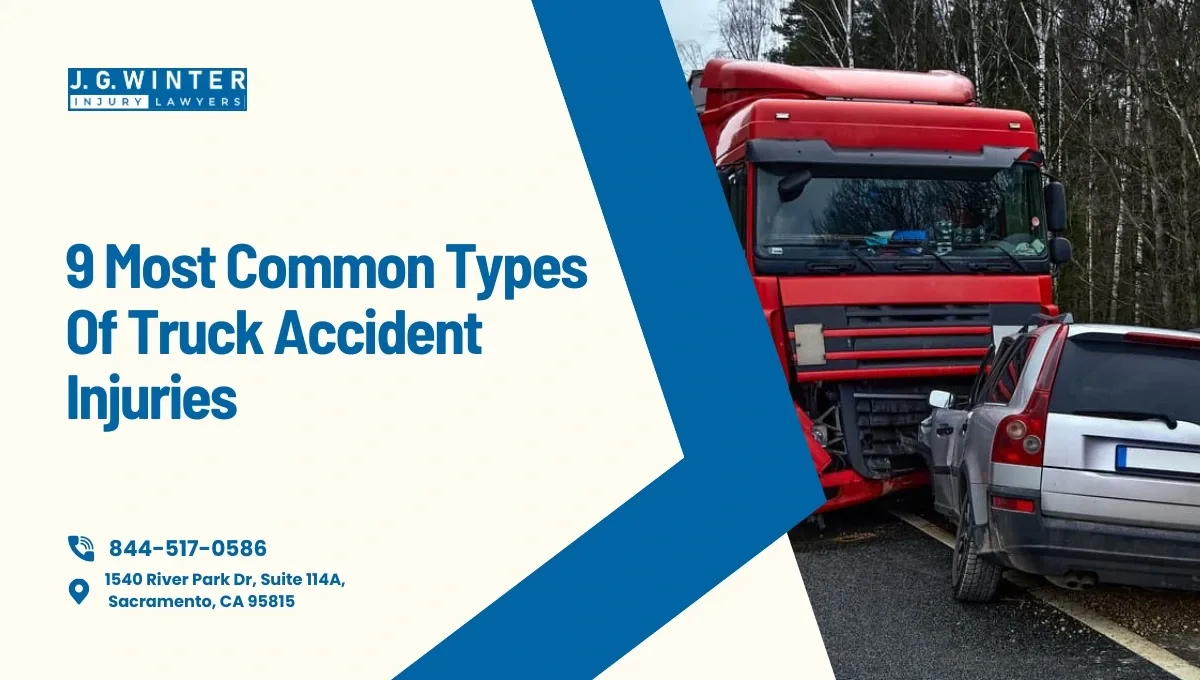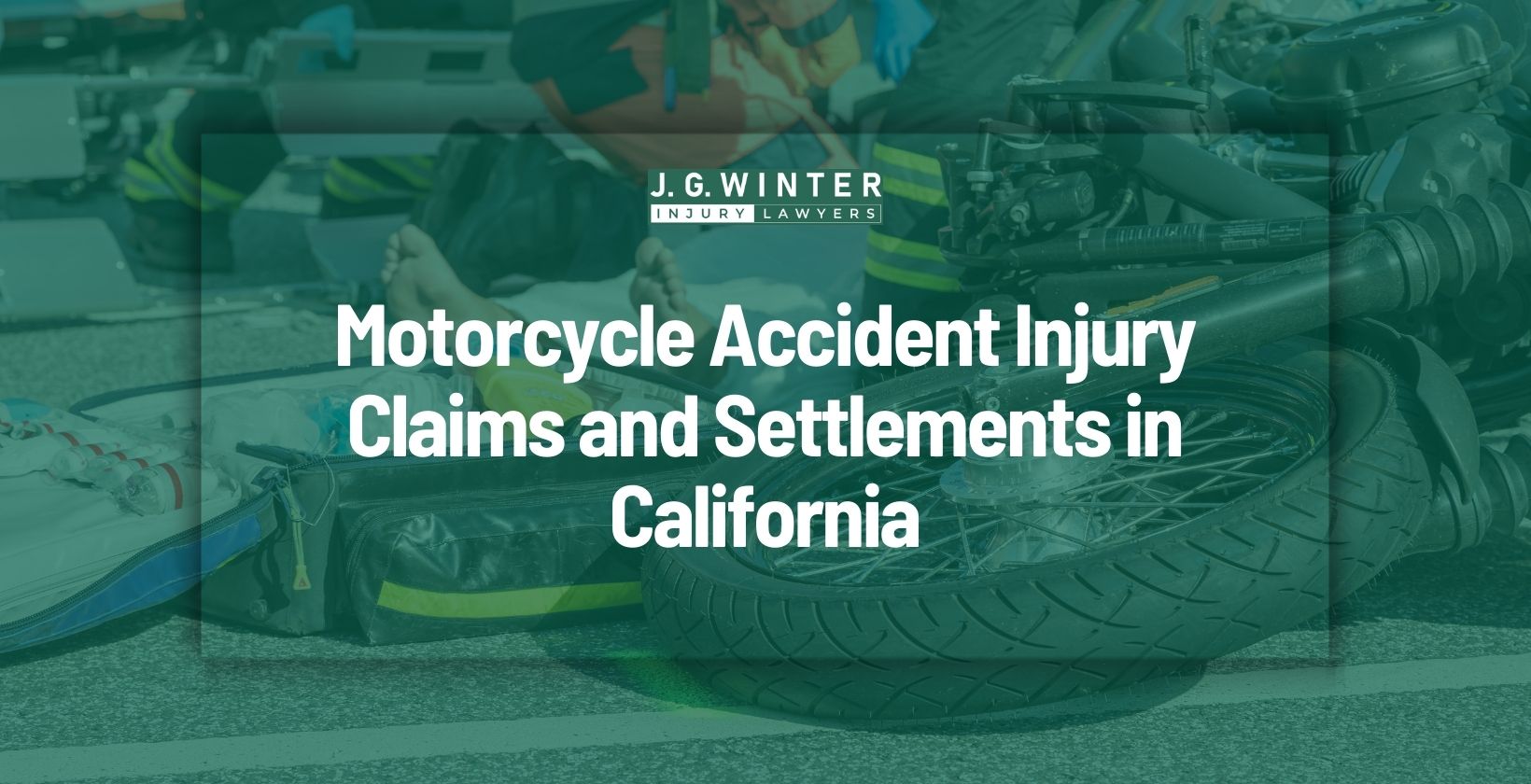Truck accident injuries can change everything in an instant and leave you to nurse serious injuries, emotional trauma, and financial stress. According to data from the National Security Council, California is one the states with the highest number of fatalities from truck crashes.
Unlike regular car crashes, truck accidents often lead to serious consequences due to the size and power of these massive vehicles. If you are in search of guidance or are considering reaching out to a truck accident injury lawyer, we’re here to help. In this article, we break down the essential information you need to go through recovery and get justice.
Understanding truck accidents and their impact
The effects of truck accidents stretch far beyond physical injuries. To fully grasp their impact, it’s crucial to understand why these crashes tend to be more severe and how they affect victims emotionally and financially.
Why truck accidents are more severe
Several critical factors make truck accidents much more dangerous than regular car crashes:
- Massive size and weight: A fully loaded semi-truck can weigh up to 80,000 pounds. When a vehicle of that magnitude collides with a passenger car, the force of impact can cause serious injuries.
- High speeds on highways: Many truck accidents occur at high speeds on highways, making the injuries even more severe due to the enormous force involved.
- Hazardous cargo: Some trucks transport flammable, toxic, or oversized cargo, increasing the likelihood of serious or even fatal injuries in a crash.
These factors combined make truck accidents uniquely dangerous and often result in life-altering truck accident injuries.
The emotional and financial toll
Recovering from common truck accident injuries is not just about physical healing. It’s also about how you cope with the emotional and financial burden that follows:
- Emotional trauma: Many victims of truck accidents struggle with anxiety, PTSD, and emotional distress as they try to process the sudden changes in their lives.
- Financial hardships: Truck accident victims often have to deal with medical bills and lost income. These expenses may put the victims and their families under financial pressure.
Understanding these challenges is the first step in reclaiming control over your life. Whether you need legal support or medical care, knowing what to expect can help you make informed decisions about your recovery from truck accident injuries.
The 9 most common types of truck accident injuries
Beyond the shock and wreckage, victims often face painful truck accident injuries, long recoveries, and financial hardships. Some heal over time, while others leave permanent scars both physically and emotionally.
Let’s take a look at nine of the most common truck accident injuries, how they happen, and what they mean for those affected.
1. Traumatic brain injuries (TBIs)
Brain injuries are one of the serious injuries truck accident victims suffer from. Even a single impact can lead to lasting cognitive and physical struggles.
- How it happens: A violent jolt or direct blow to the head during a collision.
- What it feels like: Confusion, dizziness, pounding headaches, and memory issues.
- Long-term effects: Some people experience permanent changes in thinking, movement, or even personality.
- Why it matters legally: Victims can recover damages for medical bills, lost income, and other costs related to truck accident injuries.
2. Spinal cord injuries
This truck accident injury can turn everyday movements into challenges, sometimes resulting in lifelong mobility issues.
- Severity varies: Some people experience partial loss of movement, while others face total paralysis.
- Typical causes: Usually caused by rollover crashes as well as rear-end collisions with high impact.
- The reality: These truck accident injuries often require extensive rehab, assistive devices, and ongoing medical treatment.
3. Broken bones and fractures
Truck crashes exert extreme force on the human body, making broken bones one of the most frequent truck accident injuries.
- Most commonly broken: Ribs, arms, legs, and the pelvis take the hardest hits.
- Why it’s tough: Some fractures heal quickly, but severe breaks may require surgery, months of physical therapy, and long-term pain management.
- Financial strain: Many victims miss work for weeks or months, leading to lost income and mounting expenses.
4. Internal injuries
This is perhaps one of the most dangerous injuries after a truck accident because they aren’t always obvious right away.
- Organs at Risk: The liver, spleen, and kidneys are especially vulnerable to damage in a high-impact crash.
- Why They Often Go Unnoticed: Symptoms like internal bleeding or organ failure can take hours or even days to show, making early diagnosis critical.
- The Urgency of Medical Care: Without immediate medical attention, these injuries can put the victim’s life in serious danger. Seek medical attention without delay, especially if you have plans to initiate a truck accident lawsuit to cover medical costs.
5. Burns
Burns are a devastating possibility in 18-wheeler accidents, particularly when fires, explosions, or hazardous materials are involved.
- Common Causes: Fuel leaks, vehicle fires, and exposure to dangerous chemicals.
- Burn Severity Levels: While first-degree burns are mild, second and third-degree burns can cause deep tissue damage and permanent scarring.
- The Long Road to Recovery: Severe burns often require multiple surgeries, including skin grafts, along with months of painful rehabilitation.
- Financial Consequences: Many burn victims are unable to resume normal work activities during recovery. This leads to lost wages and overwhelming medical expenses.
A truck accident injury lawyer can help victims fight for the compensation they need.
6. Lacerations and cuts
Shattered glass, twisted metal, and flying debris can cause deep cuts and lacerations in a truck accident.
- Potential risks: Deep wounds can become infected or leave permanent scars when they are not treated immediately.
- The importance of immediate medical care: Get treatments right away to lower complication risks and improve healing.
- The emotional impact: Visible scars, especially on the face or arms, can impact a victim’s self-esteem and mental well-being. If scarring or disfigurement affects your quality of life, it may be a factor in your truck accident lawsuit.
7. Whiplash and neck injuries
Whiplash is a common but often underestimated injury in truck accidents caused by the violent back-and-forth motion of the neck.
- Signs to watch for: Neck pain, stiffness, and headaches are early symptoms, but soft tissue damage can also cause long-term discomfort.
- Treatment options: Physical therapy, chiropractic care, and pain management techniques can help reduce suffering.
- Legal considerations: Since whiplash can have lasting effects, it is important to prove the severity of the injury in a truck accident lawsuit.
A truck accident injury lawyer can help document your medical condition and fight for fair compensation.
8. Chest and rib injuries
Chest injuries are among the most common consequences of crashes, especially when a victim’s body absorbs blunt force impact.
- What happens: Fractured ribs and deep muscle bruising in the chest can cause excruciating pain and limit mobility.
- Why it’s dangerous: Broken ribs make breathing difficult and can affect vital organs like the lungs. Even a seemingly mild chest injury can become serious without proper care.
9. Amputations
Handling the pain that comes from losing a limb in a truck crash is an experience that requires physical and emotional resilience.
- How it happens: Limbs may be lost immediately due to a direct impact or later because of medical complications, such as severe infections or crushed tissue.
- Long-term reality: Many survivors rely on prosthetics and intensive rehabilitation to regain independence. Beyond the physical challenges, adjusting to a new way of life takes time, support, and strength.
Hidden risks of truck accident injuries
Not all injuries are obvious right away. Some hide beneath the surface, only to show up hours or even days later. Understanding these hidden dangers can make a big difference in getting the right care before things get worse.
Delayed symptoms
Some injuries stay under the radar at first, making victims believe they walked away unharmed until the pain hits later.
- Common examples: Concussions, internal bleeding, and whiplash often don’t show symptoms immediately, which makes them easy to overlook.
- Why it happens: After an accident, adrenaline floods the body, masking pain and injuries. By the time it wears off, the damage may have worsened.
- The risk: Delayed treatment can turn a minor issue into a major medical emergency. Internal bleeding, for example, can become fatal if not caught in time.
- What to Do: Always get checked by a doctor after an accident, even if you feel fine. It’s better to be safe than to realize too late that something is seriously wrong.
Impact on pre-existing conditions
Truck accidents don’t just cause new injuries but can make existing health problems much worse.
- Who’s most at risk: People with chronic pain, arthritis, or heart conditions may find their symptoms aggravated by the trauma of a crash.
- Longer healing time: Those with pre-existing conditions often require extended recovery periods and specialized medical care.
- Important step: Let your doctor know about any underlying health issues so they can create a treatment plan that considers both old and new injuries.
Disproportionate risk for vulnerable populations
Some people face a much higher risk of severe injury in truck accidents simply because of their physical condition.
- Children: This group of people have smaller bodies and delicate bones that make them more prone to serious harm, even in minor crashes.
- Elderly individuals: Slower healing and age-related conditions increase the chances of long-term complications.
- People with disabilities: Pre-existing health conditions can complicate both treatment and recovery, making rehabilitation more challenging.
Tips for staying safe and reducing risk
To stay safe when sharing the road with big trucks, you need to practice smart driving habits. The following precautions can lower the risk of truck accident injuries and keep you safer on the road.
Defensive driving strategies
One of the most effective ways to prevent truck accidents is practicing defensive driving. Here’s how you can stay proactive behind the wheel:
- Keep a safe distance: Always allow extra space when driving behind or alongside a truck, giving yourself room to react to sudden stops or lane changes.
- Avoid abrupt braking: Trucks take much longer to come to a full stop due to their size and weight. Slamming on the brakes can cause a dangerous rear-end collision.
- Stay predictable: Use turn signals and avoid making sudden lane changes so truck drivers have enough time to anticipate your moves.
- Exercise patience: Aggressive driving, like tailgating or cutting off a truck, increases the likelihood of an accident. Give trucks the space they need.
Understanding blind spots
Large trucks have substantial blind spots, often referred to as “no-zones,” where drivers have limited visibility.
- Know the blind spots: These areas include directly behind the truck, both sides (especially the right), and the front of the cab.
- Stay visible: If you can’t see the truck’s mirrors, assume the driver can’t see you either.
- Pass quickly and safely: Always pass on the left side, where the blind spot is smaller, and avoid lingering next to the truck.
- Avoid staying in blind spots: Spending too much time in a truck’s no-zones puts you at risk if the truck suddenly changes lanes or turns.
Legal recourse for truck accident injuries
Truck accidents can be legally complicated, making it essential for victims to understand their rights. If you’ve suffered truck accident injuries, seek legal guidance to help you recover the compensation you deserve. Knowing when to contact a lawyer and how they can assist can make the process far less overwhelming.
Let’s break down when to seek legal help and the key ways an attorney can support your case.
When to contact a truck accident injury lawyer
You should consider speaking with a lawyer if any of these situations apply to you:
- Severe injuries: If you’ve sustained serious truck accident injuries requiring extensive treatment or resulting in permanent disability.
- Disputed fault: When it’s unclear who caused the accident or if multiple parties are involved.
- Insurance challenges: If your claim has been undervalued, denied, or delayed by the insurance company.
- Complex cases: Accidents that involve multiple vehicles, hazardous cargo, or other complicating factors often require legal expertise.
How a lawyer can help
An experienced truck accident lawyer can change the outcome of your case. Here’s how they can assist:
- Filing lawsuits: If negotiations fail, an attorney can help you take legal action to secure the compensation you deserve.
- Managing insurance claims: An attorney will handle communication with insurance companies, so you don’t have to deal with the stress.
- Negotiating settlements: A lawyer will ensure you receive the maximum possible compensation for your truck accident injuries.
- Proving liability: Your attorney will investigate the accident, gather evidence, and identify all responsible parties to strengthen your claim.
Conclusion
Truck accidents can lead to serious injuries, from spinal cord damage and traumatic brain injuries to broken bones and internal trauma. The physical pain, emotional toll, and financial stress can be overwhelming. Understanding the severity of truck accident injuries and their long-term impact is the first step toward seeking justice.
If you or someone you love has been hurt in a truck accident, don’t carry the burden of getting justice alone. Our experienced truck accident injury lawyer at J.G Winter can help you fight for the compensation and support you need. Contact us today to protect your rights and start your path to recovery.

Frequently Asked Questions (FAQs): Truck Accident Injuries
What should I do immediately after a truck accident?
First, take care of yourself—get medical attention, even if you feel okay. Some injuries don’t show up right away. Call the police to report the accident, snap photos of the scene, and gather contact details from witnesses. Then, consult a truck accident lawyer to understand your legal options.
Learn more in our other blog, “What to do after a truck accident?“
How long after a truck accident can symptoms appear?
Some injuries make themselves known immediately, but others—like whiplash, concussions, or internal bleeding—can take hours, days, or even weeks to show up. Just because you feel fine at first doesn’t mean you are, so it’s always smart to get checked by a doctor as soon as possible.
What’s the difference between car accident injuries and truck accident injuries?
The biggest difference? Severity. Because of their massive size and weight, trucks cause significantly more damage in collisions. While car accidents can be serious, truck crashes often result in life-changing injuries that take longer to heal and require extensive medical treatment.
How are truck accident claims different from regular car accident claims?
Truck accident claims are more complicated because multiple parties may be responsible—the truck driver, the trucking company, or even the people who loaded the cargo. On top of that, these cases involve industry-specific regulations, making it crucial to have an attorney who knows the ins and outs of trucking laws.
How can I prove the truck driver was at fault?
Gathering solid evidence is key. Police reports, witness statements, dashcam or surveillance footage, and even the truck’s black box data can help prove what really happened. A skilled truck accident lawyer can track down and present this evidence to build a strong case for you.
Can pre-existing conditions affect my injury claim?
Yes, but they don’t mean you’re out of luck. If the accident made an existing condition worse, you still have a right to seek compensation. The key is having medical records that clearly show how the crash aggravated your condition. A good attorney can help make sure that’s properly documented.
What compensation can I claim for truck accident injuries?
Depending on your situation, you may be able to recover money for medical expenses, lost wages, property damage, and pain and suffering. The more severe your injuries, the more compensation you may be entitled to.
Can I file a claim if I am partially at fault for the truck accident?
Yes, you can still file a claim, thanks to comparative negligence laws. However, your compensation might be reduced based on how much of the accident was determined to be your fault. An attorney can help fight for the best possible outcome in your case.
How long does it take to settle a truck accident lawsuit?
It depends. Some cases wrap up in a few months, while others—especially those involving serious injuries or complicated liability issues—can take years. Factors like negotiations with insurance companies and whether the case goes to trial will impact the timeline.


